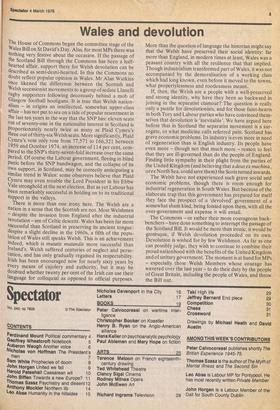Wales and devolution
The House of Commons began the committee stage of the Wales Bill on St David's Day. Alas, for most MPs there was nothing very festive about the occasion. If the passage of the Scotland Bill through the Commons has been a halfhearted affair, support there for Welsh devolution can be described as semi-demi-hearted. In this the Commons no doubt reflect popular opinion in Wales. Mr Alan Watkins once likened the difference between the Scottish and Welsh secessionist movements to a group of sedate Llanelli rugby supporters following decorously behind a mob of Glasgow football hooligans. It is true that Welsh nationalism in origins an intellectual, somewhat upper-class affair has not put to sea on a tide of popular resentment in the last ten years in the way that the SNP has: eleven seats out of seventy-one in the nationalist interest in Scotland is Proportionately nearly twice as many as Plaid Cymru's three out of thirty-six Welsh seats. More significantly, Plaid Cymru's vote only rose from 77,571 to 166,321 between 1959 and October 1974, an increase of 114 per cent, comPared to the SNP's thirty-seven-fold increase over the same Period. Of course the Labour government, fleeing in blind Panic before the SNP bandwagon, and the collapse of its ovvn support, in Scotland, may be correctly anticipating a similar trend in Wales: some observers believe that Plaid Cymru may even trouble the Lord President in his Ebbw Vale stronghold at the next election. But as yet Labour has been remarkably successful in holding on to its traditional support in the valleys.
There is more than one irony here. The Welsh are a nation in a sense that the Scottish are not. Most Welshmen despite the invasion from England after the industrial revolution are of Celtic descent. Wales has been far more successful than Scotland in preserving its ancient tongue: despite a slight decline in the 1960s, a fifth of the population of Wales still speaks Welsh. This is an achievement indeed, which is mutatis mutandis more successful than Ireland's. Welsh suffered centuries of neglect and persecution, and has only gradually regained its respectability. Irish has been encouraged now for nearly sixty years by every means of cajolery and authority, but it may be doubted whether twenty per cent of the Irish can use their language for colloquial as opposed to official purposes. More than the question of language the historian might say that the Welsh have preserved their social identity: far more than England, in modern times at least, Wales was a peasant country with all the resilience that that implied. Though industrialism transformed part of Wales, it was not accompanied by the demoralisation of a working class which had long known, even before it moved to the towns, what propertylessness and rootlessness meant.
If, then, the Welsh are a people with a well-preserved and strong identity, why have they been so backward in joining in the separatist clamour? The question is really only a puzzle for devolutionists, and for those faint-hearts in both Tory and Labour parties who have convinced themselves that devolution is 'inevitable'. We have argued here before that in Scotland the separatist movement is a surrogate, or what medicine calls referred pain. Scotland has grave economic problems. Its industry is even more in need of regeneration than is English industry. Its people have even more though not that much more reason to feel that they are ill-governed than do the people of England. Finding little sympathy in their plight from the parties of the United Kingdom (and believing that a deus ex machina, orex North Sea, could save them) the Scots turned inwards.
The Welsh have not experienced such grave social and economic problems, though there is room enough for industrial regeneration in South Wales. But because of the elaborate trap that this government has prepared for itself they face the prospect of a 'devolved' government of a somewhat sham kind, being foisted upon them, with all the over-government and expense it will entail.
The Commons or rather their more courageous backbenchers have done something to interrupt the passage of the Scotland Bill. It would be more than ironic, it would be grotesque, if Welsh devolution proceeded on its own. Devolution is wished for by few Welshmen. As far as one can possibly judge, they wish to continue to combine their proud nationhood with the benefits of the United Kingdom and of unitary government. The moment is at hand for MPs especially those Welsh Members whose courage has wavered over the last year to do their duty by the people of Great Britain, including the people of Wales, and throw the Bill out.


































 Previous page
Previous page